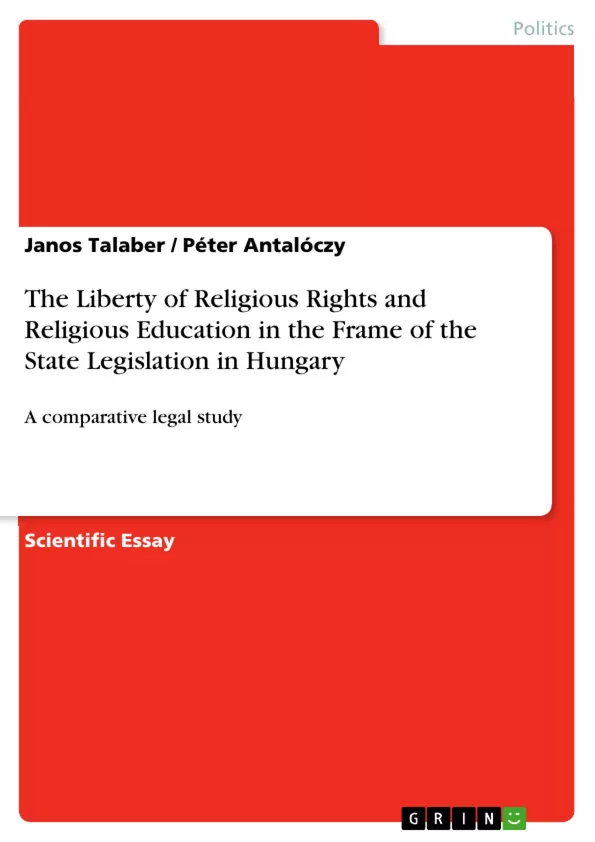In this short essay, the authors would intend to present the possible opportunities of religious education in the frame of the state legislation. Based on the current legislative issues, every faithful is entitled to get the proper religious education related to his/her own belief. However, the scale of the religious congregations might be very wide, hence the state must create a frame to fit the small churches into it. On the other hand, only the historical churches are based upon appropriate hierarchical legal structures, which of course, could be fitted into the legal frames. Therefore, it is highly recommended to deal with the Catholic legislation, and then opening up the scope towards the other historical as well as smaller churches.
Inhaltsverzeichnis (Table of Contents)
- Introduction
- The canonical education
- Primer rights to found schools
- Education in Hungary and in the USA
- Neutrality at schools
Zielsetzung und Themenschwerpunkte (Objectives and Key Themes)
This essay aims to explore the possibilities of religious education within the framework of state legislation in Hungary. The authors examine the legal rights of religious congregations to establish schools and provide religious instruction, highlighting the challenges and opportunities associated with integrating religious education into public schools.
- The rights of religious congregations to found schools and provide religious instruction
- The role of the state in regulating religious education
- The challenges of integrating religious education into a pluralistic society
- The importance of religious education in shaping moral values
- A comparative study of religious education in Hungary and the USA
Zusammenfassung der Kapitel (Chapter Summaries)
- Introduction: This introductory chapter outlines the essay's focus on religious education in the context of Hungarian state legislation. It emphasizes the need for a legal framework that accommodates diverse religious congregations, particularly smaller churches, while acknowledging the established hierarchical structures of historical churches. The chapter highlights the importance of examining Catholic legislation as a starting point for understanding the broader landscape of religious education.
- The canonical education: This chapter delves into the Catholic Church's right to found schools and institutions under current canonical legislation. It emphasizes the Church's universal mission and the significance of religious education within a comprehensive upbringing. The chapter also discusses the specific characteristics of Catholic schools and the importance of religious instruction as an integral part of the Catholic school project.
- Primer rights to found schools: This chapter explores the legal aspects of founding and managing schools according to canonical legislation. It highlights the role of the diocesan bishop in appointing religious teachers and emphasizes the need for teachers to be well-versed in the principles and methods of religious education. The chapter stresses the importance of providing religious instruction that meets the needs of diverse learners while fostering a genuine understanding of Christian wisdom.
- Education in Hungary and in the USA: This chapter examines the state of religious education in Hungary and the USA, contrasting the approaches to religious instruction in both countries. It highlights the importance of collaboration among educators and the lack of such collaboration in the Hungarian context. The chapter also discusses the challenges of integrating religious education into public schools while respecting the separation of church and state.
Schlüsselwörter (Keywords)
This comparative legal study focuses on the intersection of religious rights and state legislation in Hungary. Key themes include religious education, school founding, canonical legislation, neutrality, public schools, moral education, and comparative analysis with the USA. The authors explore the legal framework governing religious education in Hungary, the rights of religious congregations, and the challenges of balancing religious freedom with state neutrality.
Frequently Asked Questions
What are the legal rights of religious congregations in Hungary regarding schools?
Faithful are entitled to receive religious education related to their belief, and religious congregations have the right to found and manage schools within the state legislative framework.
How does Hungarian legislation accommodate smaller churches?
The state must create a legal frame that fits smaller congregations, even if they lack the extensive hierarchical structures of "historical" churches like the Catholic Church.
What is "canonical education" in the Catholic Church?
It refers to the Church's right to establish educational institutions as part of its universal mission, governed by specific Church laws (canon law).
How does religious education in Hungary compare to the USA?
The essay contrasts approaches to religious instruction, noting challenges in collaboration among educators in Hungary compared to the American context.
Why is the diocesan bishop important in Catholic schools?
Under canonical legislation, the diocesan bishop has the authority to appoint religious teachers and ensure that instruction meets spiritual and educational standards.
- Quote paper
- Janos Talaber (Author), Péter Antalóczy (Author), 2012, The Liberty of Religious Rights and Religious Education in the Frame of the State Legislation in Hungary , Munich, GRIN Verlag, https://www.grin.com/document/200695



